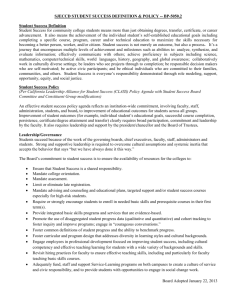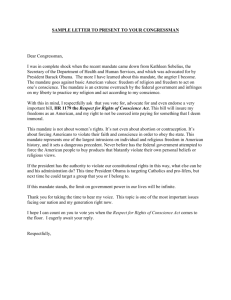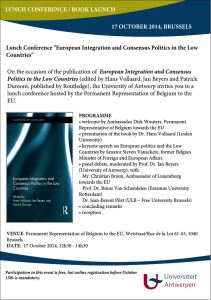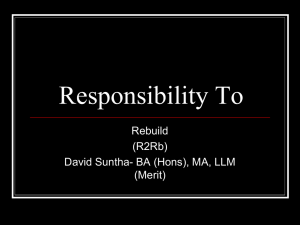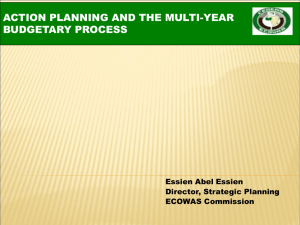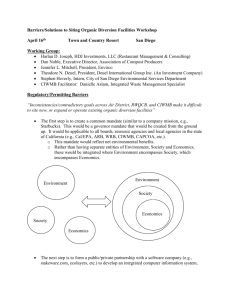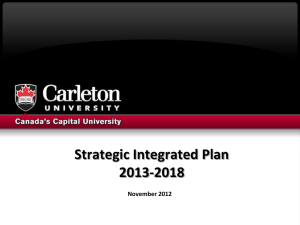PALLEMAERTS Marc - Office of the High Commissioner on Human
advertisement
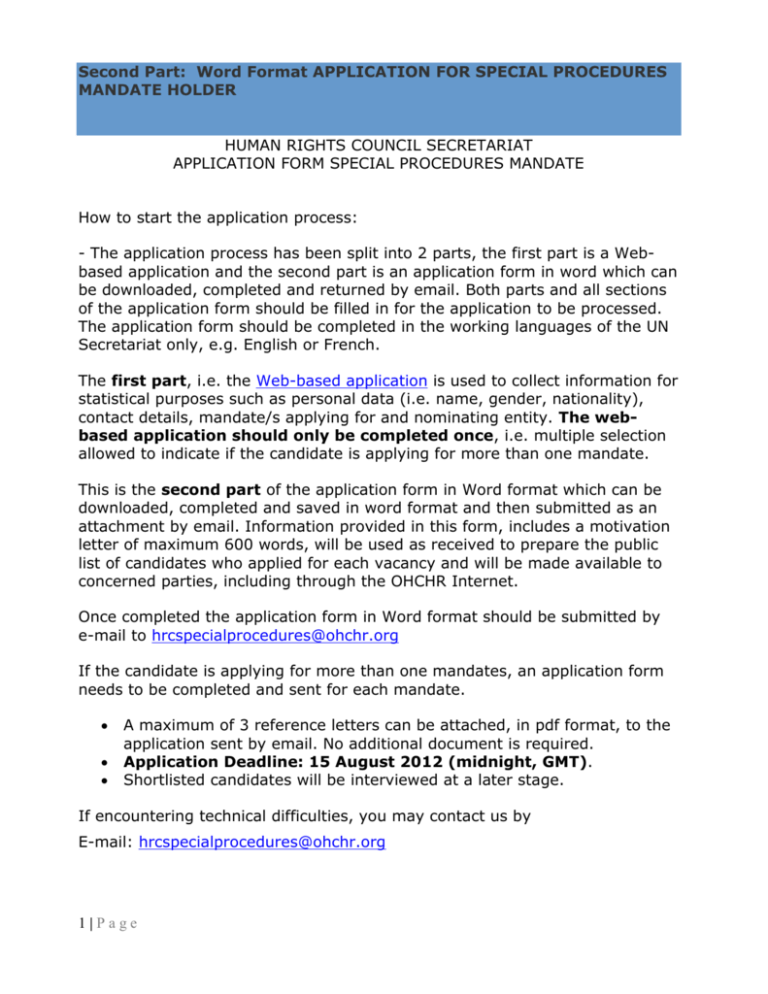
Second Part: Word Format APPLICATION FOR SPECIAL PROCEDURES MANDATE HOLDER HUMAN RIGHTS COUNCIL SECRETARIAT APPLICATION FORM SPECIAL PROCEDURES MANDATE How to start the application process: - The application process has been split into 2 parts, the first part is a Webbased application and the second part is an application form in word which can be downloaded, completed and returned by email. Both parts and all sections of the application form should be filled in for the application to be processed. The application form should be completed in the working languages of the UN Secretariat only, e.g. English or French. The first part, i.e. the Web-based application is used to collect information for statistical purposes such as personal data (i.e. name, gender, nationality), contact details, mandate/s applying for and nominating entity. The webbased application should only be completed once, i.e. multiple selection allowed to indicate if the candidate is applying for more than one mandate. This is the second part of the application form in Word format which can be downloaded, completed and saved in word format and then submitted as an attachment by email. Information provided in this form, includes a motivation letter of maximum 600 words, will be used as received to prepare the public list of candidates who applied for each vacancy and will be made available to concerned parties, including through the OHCHR Internet. Once completed the application form in Word format should be submitted by e-mail to hrcspecialprocedures@ohchr.org If the candidate is applying for more than one mandates, an application form needs to be completed and sent for each mandate. A maximum of 3 reference letters can be attached, in pdf format, to the application sent by email. No additional document is required. Application Deadline: 15 August 2012 (midnight, GMT). Shortlisted candidates will be interviewed at a later stage. If encountering technical difficulties, you may contact us by E-mail: hrcspecialprocedures@ohchr.org 1|Page PERSONAL DATA Family Name: Pallemaerts First Name: Marc Maiden name (if any): Middle name: Sex: Male Female Date of birth ( d-MMM-yy): 04-09-1960 Place of birth: Antwerp, Belgium Nationality(ies): Belgian I. MANDATE Indicate the specific mandate applied for: Note: Please select ONE only. If you are applying for more than one mandate, please submit a separate form for each mandate. 1. Special Rapporteur on the situation of human rights in Eritrea (new mandate) - A/HRC/RES/20/20 2. Special Rapporteur on the situation of human rights in Belarus (new mandate) - A/HRC/RES/20/13 3. Special Rapporteur on the implications for human rights of the environmentally sound management and disposal of hazardous substances and waste (resignation of the current mandate-holder) - A/HRC/RES/18/11 2|Page II. MANDATE - SPECIFIC COMPETENCE/QUALIFICATION/KNOWLEDGE NOTE: Please describe why the candidate’s competence/qualifications/knowledge is relevant in relation to the specific mandate: QUALIFICATIONS (200 words) Relevant educational qualifications or equivalent professional experience in the field of human rights; good communication skills (i.e. orally and in writing) in one of the official languages of the United Nations (i.e. Arabic, Chinese, English, French, Russian, Spanish.) RELEVANT EXPERTISE (200 words) Knowledge of international human rights instruments, norms and principles. (Please state how this was acquired). Knowledge of institutional mandates related to the United Nations or other international or regional organizations’ work in the area of human rights. (Please state how this was acquired). Proven work experience in the field of human rights. (Please state years of experience. 3|Page I have both a theoretical and a practical knowledge of international human rights law, as a law professor and as a former adviser and international negotiator for the Belgium government. In the course of my studies, I completed academic work in international, European, comparative and US law, including several specialised courses on the international protection of human rights (ECHR, right to food, etc.) and indigenous rights (American Indian law). I am used to working and communicating both orally and in writing in two official languages of the UN: French and English. Through my professional work in the area of environmental policy and sustainable development, I have acquired relevant experience in human rights related fields, as described below and in my letter of motivation. As a legal scholar teaching international and European environmental law, I am familiar with human rights norms and principles. This knowledge was acquired during my graduate legal studies as well as subsequently by my involvement in the activities of several international environmental NGOs, as well as by my professional work as a law researcher and professor (in the course of which I published several books and articles on human rights and the environment) and as a policy advisor to several ministers in Belgium and involvement in intergovernmental negotiations within the framework of the UN, in particular through my experience as head of the Belgian delegation to the INC that negotiated the Rotterdam Convention on PIC for hazardous chemicals and pesticides in international trade (1996-1998) and as Chairman of the Meeting of the Parties to the Aarhus Convention on Access to Information, Public Participation in Decision-Making and Access to Justice in Environmental Matters (2003-2005). ESTABLISHED COMPETENCE (200 words) Nationally, regionally or internationally recognized competence related to human rights. (Please explain how such competence was acquired). My competence in the area of rights-based approaches to environmental protection and sustainable development is attested by my publications (list attached) and internationally recognised. The Council of Europe invited me to co-edit, with one of their officials, a compendium of texts on human rights and the environment (2002). I am frequently invited to speak on human rights-related subjects at international academic and other conferences. The European Commission also recognised my expertise by appointing me as an alternate and additional legal member of the Board of Appeal of the European Chemicals Agency (ECHA) in 2008. My competence in the area was acquired both through formal education (graduate legal studies) and scholarly research (as explained above). Through my voluntary work for international environmental NGOs (such as the Pesticides Action Network (PAN) and European Centre on Sustainable Policies for Human and Environmental Rights (ECOSPHERE)) I further developed my competence in the area, and especially in the specific field covered by the mandate, i.e. the consequences for the environment and human health of international trade in pesticides and other hazardous substances. FLEXIBILITY/READINESS AND AVAILABILITY OF TIME (200 words) to perform effectively the functions of the mandate and to respond to its requirements, including participating in Human Rights Council sessions in Geneva and General Assembly sessions in New York, travelling on special procedures visits, drafting reports and engaging with a variety of stakeholders. (Indicate whether candidate can My professional activities as a law professor and senior fellow in a non-profit environmental policy research institute leave me academic freedom and the freedom to undertake a variety of activities in my fields of expertise while organising my work as I deem appropriate. I would be able to spend the equivalent of 3 months per year on the mandate, undertake field missions and meetings with stakeholders and attend relevant HRC meetings. I have sufficient seniority as an academic to be able to schedule my courses and organise my other academic duties in such a way as to free time for the duties of the mandate. 4|Page dedicate an estimated total of approx. three months per year to the work of a mandate) 5|Page III. LANGUAGES (READ / WRITTEN / SPOKEN) Please indicate all language skills Languages Arabic Chinese English French Russian Spanish Mother tongue: Dutch 6|Page Read Not Easily Easily Write Easily Not Easily Speak Not Easily Easily IV. Motivation Letter (600 word limit) I believe both my research and publication record, as set forth in the attached list of relevant publications,as well as my past leadership positions in NGOs promoting a rights-based approach to environmental protection, and my experience as a former adviser and international negotiator for the Belgian government, adequately demonstrate my expertise in the field covered by the mandate. I hold a Ph.D. in international and European law from the Vrije Universiteit Brussel (VUB) (1999), as well as two other postgraduate law degrees: a Master’s degree in international and comparative law from the VUB (1984), and an LL.M. from Harvard University (1985). In addition to my qualification as a lawyer, I also obtained the equivalent of a Master’s degree in international relations (VUB, 1989). My internationally recognised expertise on issues of access to information, public participation and access to justice in environmental matters, and in particular my experience as Chairman of the Meeting of the Parties to the Aarhus Convention from 2003 to 2005, are directly relevant to the mandate. The position of Special Rapporteur on the implications for human rights of the environmentally sound management and disposal of hazardous substances and wastes is particularly appealing to me as it would allow me to draw upon my expertise in the field of the relationship between human rights and environmental issues and of international regulation of hazardous substances and wastes. The latter was the subject of my doctoral dissertation in law. I became acquainted with the UN's work on the relationship between human rights and various aspects of environmental protection through my academic research on these matters, which resulted, inter alia, in the publication of a compendium of texts on human rights and the environment by the Council of Europe in 2002, as well as in several articles in academic journals and conference proceedings. I was also directly involved in NGO action on international trade in hazardous substances and wastes, participated in the establishment of the Pesticides Action Network (PAN) International in 1982 and served as voluntary legal adviser to that organisation from 1982 to 1992, representing it at a significant number of intergovernmental meetings within the framework of the FAO and UNEP, during their development of soft law instruments to address international trade in hazardous substances. Between 1989 and 1992, I participated in NGO campaign work to ban transnational movements of hazardous wastes to developing countries, in the context of the negotiation of the Basel Convention and the 1989 Lomé Convention between the EU and its Member States and the African, Carribean and Pacific States. In a later stage of my career, while I served as a policy adviser to several ministers of the environment and sustainable development in Belgium between 1992 and 1999, I participated in multilateral environmental negotiations as a senior member or head of the Belgian delegation. Of direct relevance to the mandate was my role as head of the Belgian delegation to the intergovernmental negotiating committee which elaborated the Rotterdam Convention, which is specifically mentioned in HRC Resolution 18/11, between 1996 and 1998. Stakeholder relations are one of my main responsibilities in my current job as Senior Fellow and research programme manager at IEEP, as the organisation of stakeholder consultation events is part of my applied policy research work. My work as an academic, government official and, previously, as an environmental NGO worker, has given me the opportunity to visit many developing countries and to collaborate with colleagues from those countries on a number of projects. 7|Page V. EDUCATIONAL RECORD NOTE: Please list the candidate’s academic qualifications: (university level and higher) Name of degree and name of academic institution Licentiate in Law, 1983 (Licentiaat in de rechten) Master in International and Comparative Law, 1984 Licentiate in Political Science/International Relations (Licentiaat in de politieke wetenschappen/internationale betrekkingen), 1989 Doctor of Laws, 1999 Years of Attendance Place and Country 1978-1999 Brussels, Belgium 1984-1985 Cambridge, Massachusetts, USA Vrije Universiteit Brussel Master of Laws (LL.M.) Harvard Law School Certificate of Attendance, Centre for Study and Research Hague Academy of International Law 8|Page 1985 The Hague, Netherlands VI. EMPLOYMENT RECORD NOTE: Please briefly list ALL RELEVANT professional positions held, beginning with the most recent one: Name of Employer Functional Title Main functions of position Years of Attendance/ Work Place and Country Professor of European Environmental Law, Faculty of Law, University of Amsterdam 2008-current Amsterdam, The Netherlands Senior Fellow & Head of the Environmental Governance Programme and subsequently of the Global Issues and External Action Programme, Institute for European Environmental Policy (IEEP) 2005-current Brussels , Belgium Lecturer in International and European Environmental Law, Faculty of Law & Institute for European Studies, Université Libre de Bruxelles 1995-current Brussels, Belgium Senior Lecturer in International Environmental Policy and Law, Master's Programme in Human Ecology, Vrije Universiteit Brussel 1989-2008 Brussels, Belgium Alternate and Additional Legal Member, Board of Appeal, European Chemicals Agency (ECHA) 2008-current Helsinki, Finland Legal Adviser, Office of the Flemish Regional Minister of Environment and Housing 1992-1995 Brussels, Belgium Legal Adviser, Office of the Federal Secretary of State for Safety, Social Integration and Environment 1995-1999 Brussels, Belgium Deputy Chief of Staff & Legal Counsel,Office of the Federal Secretary of State for Energy and Sustainable Development 1999-2003 Brussels, Belgium Lecturer in Environmental Law, Faculty of Law, Vrije Universiteit Brussel 1994-2004 Brussels, Belgium Lecturer in Environmental Law,Institute for Environmental Management and Physical Planning, Université Libre de Bruxelles 9|Page 1996-2010 Brussels, Belgium Lecturer in European Community Law, Faculty of Law, Vrije Universiteit Brussel 2001-2004 Brussels, Belgium Senior Research Fellow, Institute for European Studies, Vrije Universiteit Brussel 2003-2005 Brussels, Belgium 10 | P a g e VII. COMPLIANCE WITH ETHICS AND INTEGRITY PROVISIONS (of Council Resolution 5/1) 1. To your knowledge, does the candidate have any official, professional, personal, or financial relationships that might cause him/her to limit the extent of their inquiries, to limit disclosure, or to weaken or slant findings in any way? If yes, please explain. No 2. Are there any factors that could either directly or indirectly influence, pressure, threaten, or otherwise affect the candidate’s ability to act independently in discharging his/her mandate? If yes, please explain: No 3. Is there any reason, currently or in that past, that could call into question the candidate’s moral authority and credibility or does the candidate hold any views or opinions that could prejudice the manner in which she/he discharges his mandate? If yes, please explain: No 4. Does the candidate comply with the provisions in paragraph 44 and 46 of the Annex to Human Rights Council resolution 5/1? Para. 44: The principle of non-accumulation of human rights functions at a time shall be respected. Para. 46: Individuals holding decision-making positions in Government or in any other organization or entity which may give rise to a conflict of interest with the responsibilities inherent to the mandate shall be excluded. Mandate-holders will act in their personal capacity Yes. I have previously worked as a government official in Belgium but no longer do so since 2003. 11 | P a g e 5. Should the candidate be appointed as a mandate holder, he/she will have to take measures to comply with paragraphs 44 and 46 of the Annex to Council resolution 5/1. In the event that the current occupation or activity, even if unpaid, of the candidate may give rise to a conflict of interest (e.g. if a candidate holds a decision-making position in Government) and/or there is an accumulation of human rights functions (e.g. as a member of another human rights mechanism at the international, regional or national level), necessary measures could include relinquishing positions, occupations or activities. If applicable, please indicate the measures the candidate will take. None of my current positions entails a risk of conflict of interest with the duties of the mandate. You will receive an acknowledgment when we receive both parts of the application process, i.e. the information through the Web-based application and the Word application form by email. Thank you for your interest. 12 | P a g e
